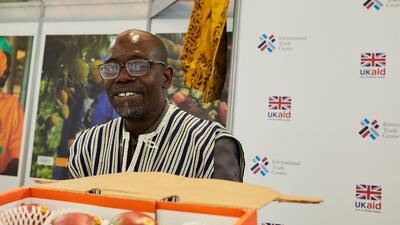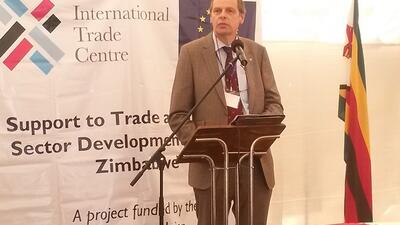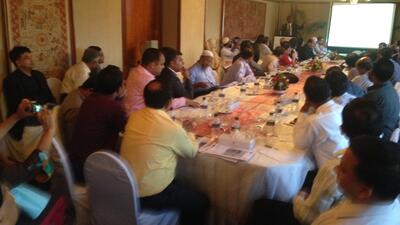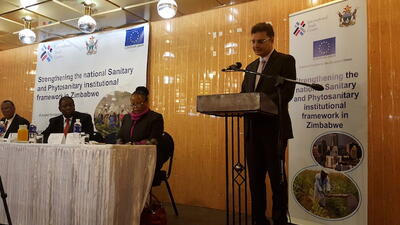
Remarks by ITC Deputy Executive Director Dorothy Tembo at ZimTrade Annual Exporters’ Conference
His Excellency, President Emmerson Mnangagwa, Honorable Sithembiso Nyoni, Minister of Industry and Commerce, Honorable Frederick Shava, Minister of Foreign Affairs and International Trade, Ms. Clara Mlambo, Board Chair, ZimTrade, Mr. Allan Majuru, ZimTrade Chief Executive Officer, Distinguished guests, ladies and gentlemen,
I’m delighted to be back in Harare, a city that I have come to know well and one which has a vibrant business community. And I am especially glad to join you all for the ZimTrade Annual Exporters’ Conference and Exporter of the Year Awards!
This is an event that gives us an opportunity to celebrate recent milestones. It also allows us to reflect on how we can work together more closely to achieve even greater export-led growth—while also ensuring that this growth helps achieve Zimbabwe’s policy goals.
ZimTrade has long been an important partner for ITC and we are deeply grateful for our continued collaboration. As many of you will know, ZimTrade won last year’s World Trade Promotion Organizations’ award for the best initiative for inclusive and sustainable trade—a recognition that is extremely well-deserved. I’m excited to see what the future holds for them, and for our work together.
The time travellers’ video that we just saw already gave us an exciting window into what’s possible for Zimbabwe’s exports, and I was very glad to hear my fellow presenter just outline the role that technology can play. That’s why today I’d like to make four points, which I hope can prove useful for today’s conversations.
I’d like to first highlight some recent developments we’ve seen in Zimbabwe that make us excited for the future of its SMEs, which account for 90 percent of the country’s businesses. I’ll also describe some risks to be mindful of moving forward, especially at this time of converging crises at the global scale, and what these risks mean for local SMEs.
I’d then like to highlight the lessons we’ve learned at ITC on inclusion and why supporting women-led businesses can be a game-changer for export competitiveness, including in Zimbabwe. I’ll then give a few other examples of ways to help Zimbabwean SMEs become more competitive on international markets, drawing from our recent work. Lastly, I’ll close with a forward look based on our new research on the competitiveness of local SMEs.
To begin, I’d like to set the stage with some recent history. Over the past few years, we’ve seen Zimbabwe make concerted international re-engagement efforts to forge deeper relationships with its partners, such as the United States, the European Union, the United Kingdom, and the Commonwealth. These efforts are commendable, and we can see that they are already making a difference—including for Zimbabwe’s trade prospects and for the small businesses that drive the domestic economy.
And today, we’re now at the midway point of Zimbabwe’s National Development Strategy 1, or NDS1, which is helping bring the country closer to delivering on the 2030 Agenda for Sustainable Development, Zimbabwe’s own Vision 2030 statement, and the African Union’s Agenda 2063.
This NDS1, I should note, foregrounds the role of small and medium-sized businesses in making Zimbabwe’s sustainable development objectives become a reality.
These are exciting milestones, and they’re making an impact.
Despite these important steps, recent years have been hard on Zimbabwean SMEs, amid the COVID-19 pandemic, rising inflation, and other economic hurdles. These small businesses are often the first to experience the fall-out of external shocks and internal instability—which in turn has a ripple effect across the entire economy and society.
There is, however, a way forward, and trade has a big role to play. At ITC, we’ve learned that trade has the maximum potential for good if it is connected, sustainable, and inclusive. And as we see daily through our flagship women and trade program, SheTrades, women-led and women-owned businesses play a crucial part in making export-led growth and competitiveness possible, while helping make sustainable development objectives become a reality.
At the continent-wide level, we’ve seen at ITC that women businesses account for one-third of African SMEs—yet only one out of five exporting companies in Africa is led by women. Looking specifically at Zimbabwe, women make up over half of the country’s population. That’s why it matters, today more than ever, that we ramp up our efforts to support women’s economic empowerment in Zimbabwe, and that includes addressing those hurdles that remain towards their participation in international trade.
Fortunately, we are already seeing in Zimbabwe some good practices to build upon—practices that can, in turn, help women-led and women-owned businesses thrive. For instance, our SheTrades Outlook identified the Zimbabwe Women’s Microfinance Bank as one example of a good practice for enabling women’s financial inclusion and economic empowerment, and this bank is also providing invaluable support to youth and people with disabilities. And last year, ZimTrade launched the Next SheExporter Programme to help provide women entrepreneurs with training and support to better access international markets.
Another big step has been the Reserve Bank of Zimbabwe’s efforts to collect gender-disaggregated data in the financial sector. As we all know, better data leads to better-informed decisions, making it easier to determine how to support women-owned and women-led SMEs.
These are valuable steps towards better integrating women entrepreneurs into Zimbabwe’s economy, including through trade. I’d also like to highlight some other steps that can make a huge difference for Zimbabwe’s SMEs, drawing from our recent work on the ground.
For instance, our ITC projects in Zimbabwe have shown us the value of investing in SME training, including our ongoing work to help support local businesses in taking advantage of the opportunities afforded to them under the African Continental Free Trade Area. This is an effort that brings together our SME Trade Academy with the expertise and support of the Afreximbank and local partners, while incorporating lessons from the project’s pilot phase in Côte d’Ivoire, Nigeria, and Rwanda.
This year, we’ve also been working to expand our Diploma in International Trade—another one of the success stories from our SME Trade Academy—so that Zimbabwean SMEs and other trade professionals can access this training and obtain this internationally accredited qualification. We’ve been fortunate to work with ZimTrade in making this training available locally, and we are thankful to the Institute of Exports and International Trade for their collaboration in the project at large.
Training is one way to help support Zimbabwean exporters. Working with these companies to move up the value chain and get greater exposure to international buyers is another.
For instance, as a contribution towards the Zimbabwean Government’s Horticulture Recovery and Growth Plan, we’ve been working over the past several years with smallholder farmers in Zimbabwe’s horticultural industry so they have a better chance at accessing international markets. We’ve been grateful for the support of the UK’s Foreign, Commonwealth & Development Office in making this work possible.
More specifically, we’ve teamed up with farmers in Zimbabwe so they can get their peas and chillis to markets in several European countries, including through the adoption of a traceability system. These farmers who were exporting peas and chillis have now diversified their production to include avocados, macadamia nuts, rosella, and potatoes.
Reinforcing my earlier point on inclusion, I’d like to highlight that this is a sector that is dominated by women exporters.
Under the same program, we were able to bring some of these companies to a trade fair in Berlin last year, and we once again had the great pleasure of collaborating with ZimTrade at this high-profile event, which featured thousands of exhibitors from nearly 70 countries. This is the kind of exposure that SMEs need.
These are just a few examples I can give. I would like to hear more from you about how ITC can continue to support Zimbabwean SMEs, and in turn help Zimbabwe achieve its goals of sustainable, inclusive growth.
Before I close, I’d also like to give you a quick preview of our new report on SME competitiveness in Zimbabwe, which we are launching later today. This survey gave us a window into some of the challenges that local SMEs are currently facing, as well as how to support them.
In this survey, we worked with the National Competitiveness Commission to reach out to 557 businesses, which are of varying sizes and are working across different sectors of Zimbabwe’s economy. Their feedback was invaluable: they showed us that while they have the potential to help the country achieve its goal of becoming an upper-middle income economy by the end of the decade, they need greater support for this to be possible.
For instance, they need better access to business support networks, and those SMEs that have incorporated digital technologies into their business models tend to fare better on the international stage. And they therefore need a policy environment that enables greater digitalization and that empowers business support services.
We’re grateful for the support of Zimbabwe’s Ministry of Industry and Commerce, as well as the Ministry of Women Affairs, Community, Small and Medium Enterprises Development, in making these conversations possible. And we look forward to discussing these survey’s findings at length later today.
In light of the findings from the survey, I’m very excited to see that technology is a recurring theme across today’s agenda. At ITC, we strongly believe in the power of digital connectivity to open up new opportunities for small businesses, both in their day-to-day activities and in their plans to export abroad.
Digital connectivity has become such an integral part of ITC’s work that we’ve actually designated this issue as one of our four “moonshots,” taking inspiration from that famous injunction that we must “shoot for the moon. Even if you miss, you’ll land among the stars.” In that spirit, I look forward to hearing your ideas on how we can best scale up access to digital technologies for Zimbabwean SMEs and help make that moonshot dream into a reality.
Thank you all for your time and attention. I look forward to seeing where our conversations lead.














